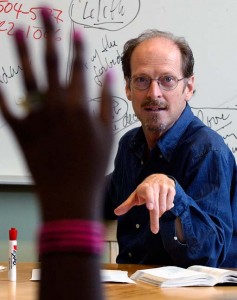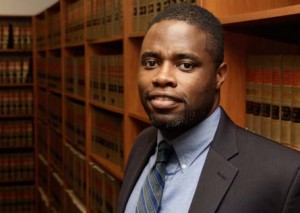 William M. Moore
William M. Moore
Faculty member from 1978–2008
Bill Moore died on September 11, 2014. Many friends and family, alumni, faculty and staff gathered in King Theatre on October 11, 2014, to share reflections about Bill and celebrate his life. Speakers recounted stories about Bill’s warmth and humor, his care, his boundless intellect and charming, engaging style. Memories of Bill are vivid and enduring.
Because it so aptly captures Bill as he was known by many Miltonians, Milton Magazine reprints here the tribute that David Smith, former English department chair, wrote and delivered at Bill’s resignation in June 2008.
Bill Moore cannot be with us this afternoon. He is somewhere between here and Tijuana, tracing the route of a cross-country road trip that his father took as a 21-year-old in 1926. This is a typical Bill Moore project, a combination of meticulous scholarly preparation and high aesthetic pleasure. Working with a vintage road map and his father’s journals, he has pinpointed the site of each of 182 photos in an album from the trip and will, à la recherche du temps perdu, replicate them with his own camera. He asks us to think of him “perched on a high rock in a National Park, photographing with a ‘Kodak Junior’ and writing about all I feel and see, happy to be alive.”
Many at Milton Academy, in the 30 years since Bill arrived here, have been happily infected with the joie de vivre that he brought to his work. An academician to the core, he was so much more than an academician that no whiff of chalk dust ever clung to him, and he moved instead through the school day like an artist blotched with the bright drips from his latest canvas or humming a few bars of a new composition. Yes, his classes — whether in French, the subject that he originally came to Milton to teach, or in English, to which we welcomed him enthusiastically during a dip in French enrollment 15 years ago — were about plumbing the structure of language and explicating text. But they were also about inhaling, as deeply as possible, the spirit of an intellectual life. His comments on student papers took the form of cultivated conversation — usually gentle and appreciative, often in the form of questions rather than answers, sometimes breaking out into sly humor. My son, who relishes a satirical barb even when it is aimed his way, was delighted to receive a note instructing him to push the spell-check button because “correct spelling lends a certain cachet to bombast.”
On behalf of his students, Bill was always working to get literature to stand up from the page and dance. [Of a class of Bill’s that Marie Annick Schram (former faculty, modern language department) observed the day she interviewed at Milton, she recalls so much laughter and energy that “even Napoleon, hanging on the wall, seemed to be taking part.”] Because Shakespeare meant more on the stage than it could even in his highly theatrical classroom, he organized a trip whenever there was a production in town. An accomplished cook, he marked the end of To the Lighthouse by reenacting the great dinner party scene, complete with Mrs. Ramsay’s boeuf en daube. Like Mrs. Ramsay, he knew how to make people around a table awaken to each other, a skill equally valuable to hostesses and teachers.
Colleagues, too, enjoyed Bill’s talent for organizing revelry. Because he found himself temperamentally unsuited to the position of academic dean, his tenure in it was rather brief; what sticks in memory is the panache of the faculty shindig that he organized to lift us out of one winter’s doldrums and christened, impishly, “The Other Dean’s Ball.” On a smaller scale, the delicacies and amenities that he supplied for English department sherry hours lent refinement to what might otherwise have devolved into afternoons of grumpy shop talk.
The word “glamour,” etymologists tell us, derives directly from the word “grammar”: it is the magical aura that plays about deep learning. Bill fused these principles perfectly, often making the glamour so delightful that the grammar went down without much fuss. Not far beneath them both, however, for most of his recent years with us, was his sorrow in the long illness and death of his beloved Nina. His own loss only deepened his compassion for students; the odd, the troubled, and even the outright refractory will not forget the kindness he showed them.
When the department moved to Warren Hall seven years ago, Bill made his home in the crow’s nest of the Student Center and transformed that lofty classroom into a small art museum, bathed in serene light and set just far enough back from the rumble in the stairwell. There, in a setting that epitomized him, he and his students could stick their heads into the clouds and forget about the turmoil below. I like to think of him leaving us by a kind of apotheosis, as if he came to the head of the stairs but kept right on going, to emerge at last into a world entirely composed of books and music and travel and theater and food and art.
 Ronnell Wilson ’93, Milton Academy Trustee
Ronnell Wilson ’93, Milton Academy Trustee
“Mr. Moore” as a mentor and friend
In his Class IV year, a serendipitous shift into Mr. Moore’s French I section gave rise to Ronnell’s long, close friendship with Bill. Drawing from his stories, Ronnell sketched the man that everyone recognizes:
“ . . . The rest of freshman year I fell in love not so much with French as with the way Bill brought the language to life in class. For Bill, French wasn’t just a foreign language. It was the Rosetta stone that his students needed to delve into the psychology of Sartre, Ionesco and Camus. Watching Bill at work in the classroom taught me that to be a great teacher, you must first be a great learner. Bill was always learning, always curious, always seeking out new food, new music, new perspectives. Bill was a great teacher because he never stopped being a curious student.
“ . . . A second great lesson Bill gave me about teaching: Great teachers master the art of asking the right questions and putting their students in the right situations to learn and formulate their own views. It’s a delicate balance that Bill developed over the years. Bill would walk just far enough behind you so that he could reach out and grab your shoulder if you were about to walk off of a cliff. But if he saw you walking toward a pile of dog crap, every now and then he’d let you step in it. That is, after all, part and parcel of the learning process.
“ . . . I will miss many things about Bill — his intellect, his sensitivity, his untamed curiosity and his mischievous laugh. I will miss his empathy and unabashed support for the underdog. Most of all, I will miss his overpowering sense of adventure.
“For nearly a quarter century, I have been blessed to have Bill Moore within my small circle of friends. Now that he is gone, all I can do is remember him, miss him, and hope that somehow I was as good a friend to him as he was to me.”



